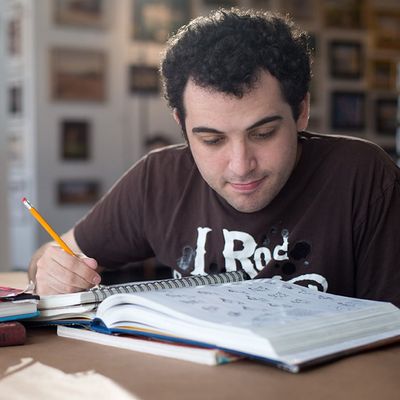
In 2014, the investigative journalist Ron Suskind (The One-Percent Doctrine) came out with a memoir called Life, Animated: A Story of Sidekicks, Heroes, and Autism. The publisher, Kingswell, was an imprint of Disney, which made sense since the book is just about the best advertisement the company could ever have. Suskind tells the story of his autistic son, Owen, and how Disney’s animated features supposedly brought the child back from a kind of locked-in netherworld.
I say “supposedly” not because I doubt Suskind’s account but because there’s no way of knowing if or when Owen would have found his voice without those cartoons — no way of going down the road not taken. Roger Ross Williams’s documentary, Life, Animated, makes a moving case for Disney, though. Observing Owen watch The Little Mermaid or Aladdin or The Lion King, I found it hard not to cry. And I don’t particularly even like Disney animation. (All right, that’s not precisely true. I’m just feeling anti-corporate these days and there’s no pop-culture entity more manipulative than Disney.)
Life, Animated jumps back and forth between Owen at age 23 and as a little boy, seen in home videos and original animation by the French visual-effects company Mac Guff. The second son of Ron and his wife, Cornelia, he at first seemed “normal,” but rapidly regressed at age three, losing both motor skills and language. Says Suskind, “Someone kidnapped our son.” The diagnosis was autism. In the movie’s present tense, Owen is in the process of graduating from a special school in Cape Cod. He’ll be moving into his own apartment in an assisted living facility. He has a girlfriend named Emily. And he’s not only still watching Disney cartoons, he even runs a Disney cartoon club, which he says makes him popular with other students.
What accounted for Owen’s perceptual leap? Suskind says it happened when they were showing Owen Disney cartoons just to “keep him calm.” One day he came to his parents saying words they could barely understand. They turned out to be, “Just your voice,” a phrase from The Little Mermaid, whose heroine is told she’ll have to surrender one thing. A doctor told the Suskinds this might be “ecolalia” — mere repetition. But Suskind thought it was Owen’s way of telling them that he was “still in there.” Mac Guff animates a scene in which Ron sneaks up on Owen with a puppet of Iago from Aladdin and — doing a great Gilbert Gottfried impression — engages his son in the first real conversation they’ve had in years.
I had to fight off skepticism about Life, Animated — it feels a little tidy. But maybe there is something to be gained from identifying with a character onscreen if you have immense difficulty navigating the world. Maybe movies as straightforward dramatically as Peter Pan, Pinocchio, The Little Mermaid, Aladdin, The Lion King, etc., can help someone with difficulty interpreting social cues. Maybe they can even help such a person develop empathy.
Owen is a hugely engaging screen presence. He paces, hands clenched behind his back, anxious about what people think of him. He beams as he interprets for other young people with autism the lessons of The Lion King. It’s nice when you have an in at Disney, too — a few of the actors from the movie show up. (No spoilers.) But the most marvelous part of Life, Animated is when Owen conceives of his own animated film, based on his feeling that he’ll never be a hero, someone capable of making strong choices and leading, but only a sidekick to a hero. He writes and sketches Land of the Lost Sidekicks — which director Williams actually turned into a film. What we see of that film is both heartbreaking and exhilarating. As a feat of imagination, it’s heroic.
Owen’s story is hardly settled in Life, Animated. He’ll need to be taken care of for life, and the responsibility might eventually fall on his older brother, who’s being interviewed when a call comes in that Owen’s girlfriend has broken up with him. Now Owen is bereft, uncomprehending. He cries out in pain. He can’t make sense of the breakup. His father worries that Owen needs to learn how to fail — and fail again and again and keep moving on — and wonders how his son will come to grips with that. There are things on heaven and earth that are undreamt of in the Disney-cartoon philosophy.


